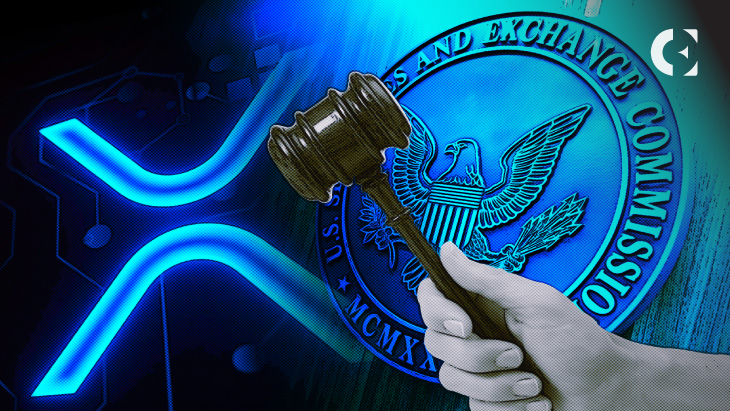Trump's Influence On Ripple: How It Affected XRP

Table of Contents
The Regulatory Uncertainty of the Trump Era and its Ripple on XRP
The Trump administration's approach to cryptocurrency regulation created a climate of uncertainty that significantly impacted Ripple and XRP. This lack of clear direction led to increased market volatility and impacted investor confidence.
Increased Scrutiny of Cryptocurrencies
The Trump era witnessed heightened regulatory interest in cryptocurrencies. This scrutiny stemmed from concerns about the potential for illicit activities, such as money laundering and terrorist financing.
- Increased SEC Activity: The Securities and Exchange Commission (SEC) under Chair Jay Clayton increased its enforcement actions against cryptocurrency projects.
- Official Statements of Concern: Several high-ranking officials within the Trump administration publicly voiced concerns about the risks associated with cryptocurrencies.
- Lack of Comprehensive Legislation: Despite growing interest, Congress failed to pass any comprehensive legislation regulating cryptocurrencies during this period.
This general climate of uncertainty negatively affected investor sentiment towards XRP. The lack of clear rules made it difficult for investors to assess the risks and potential rewards associated with investing in XRP, contributing significantly to its price volatility.
Lack of Clear Regulatory Framework
The absence of a comprehensive and clear regulatory framework for cryptocurrencies during the Trump administration created significant challenges for businesses like Ripple.
- Inconsistent Messaging from Government Agencies: Different government agencies offered conflicting perspectives on how cryptocurrencies should be regulated, leading to confusion and uncertainty.
- Difficulty in Navigating Regulatory Landscape: Ripple, like other cryptocurrency businesses, struggled to navigate this ambiguous regulatory landscape, impacting its operations and ability to plan for the future.
- Uncertainty for Investors: This ambiguity created uncertainty among XRP investors, making them hesitant to invest heavily in the cryptocurrency.
This regulatory uncertainty significantly hampered Ripple's growth and development, contributing to a period of instability for XRP's market value.
Ripple's Legal Battles and Trump's Appointment of SEC Chair Jay Clayton
The appointment of Jay Clayton as SEC Chair during the Trump administration marked a turning point in the regulatory landscape for cryptocurrencies, and Ripple felt the impact acutely.
The SEC's Increased Enforcement
Under Clayton's leadership, the SEC significantly increased its enforcement actions against cryptocurrency projects, raising concerns about the future of the industry.
- Focus on Initial Coin Offerings (ICOs): The SEC focused on cracking down on ICOs, many of which were deemed to be unregistered securities offerings.
- Increased Scrutiny of Exchanges: Cryptocurrency exchanges also faced increased scrutiny from the SEC regarding compliance with securities laws.
- Targeting of Prominent Projects: The SEC targeted several high-profile cryptocurrency projects, sending a strong message about its commitment to enforcing existing securities laws in the crypto space.
Clayton's stance on cryptocurrencies, often characterized as cautious and skeptical, set the stage for increased regulatory challenges for Ripple.
The SEC Lawsuit Against Ripple
The SEC's lawsuit against Ripple, filed in December 2020, significantly impacted XRP's price and market position. This legal battle, initiated during Trump's presidency, added to the existing regulatory uncertainty surrounding the cryptocurrency.
- Charges of Unregistered Securities Offering: The SEC charged Ripple with conducting an unregistered securities offering through the sale of XRP.
- Market Reaction to the Lawsuit: The lawsuit resulted in a significant drop in XRP's price and increased volatility in the market.
- Ongoing Legal Proceedings: The lawsuit continues to unfold, with ongoing legal battles and uncertainties surrounding its outcome.
The SEC lawsuit against Ripple remains a defining event in the cryptocurrency industry, highlighting the regulatory challenges facing companies operating in this space.
Trump's Economic Policies and their Indirect Impact on XRP
Trump's economic policies, while not directly targeting cryptocurrencies, indirectly influenced the overall market sentiment and XRP's price.
Impact of Economic Policies on Market Sentiment
Trump's economic policies, such as trade wars and tax cuts, had a ripple effect on investor sentiment toward riskier assets, including cryptocurrencies.
- Trade Wars and Market Volatility: Trump's trade wars created uncertainty in the global economy, impacting investor confidence and leading to volatility in cryptocurrency markets.
- Tax Cuts and Investor Behavior: The impact of tax cuts on investor behavior toward cryptocurrencies is complex and multifaceted, with some arguing it spurred investment and others suggesting it had little effect.
- Economic Growth and Cryptocurrency Investment: Periods of strong economic growth often see increased appetite for riskier investments, including cryptocurrencies, while economic downturns can have the opposite effect.
These broader economic factors significantly influenced the overall environment in which XRP operated.
Global Political Climate and XRP
The global political climate under Trump's presidency also played a role in influencing the price and perception of XRP.
- Geopolitical Uncertainty and Market Volatility: Geopolitical events and uncertainties during Trump's term, such as increased international tensions, could impact investor sentiment towards riskier assets like XRP.
- Shifting Global Economic Landscape: Changes in the global economic landscape influenced the overall risk appetite of investors, which impacted their investment decisions related to cryptocurrencies, including XRP.
- Regulatory Changes in Other Jurisdictions: Regulatory developments in other countries regarding cryptocurrencies could also indirectly impact XRP’s price and market perception.
Conclusion
Trump's presidency, characterized by regulatory uncertainty and increased SEC scrutiny, significantly impacted Ripple and the value of XRP. The lack of a clear regulatory framework, coupled with the SEC lawsuit, created a volatile environment for the cryptocurrency. Indirectly, broader economic policies also played a role in shaping investor sentiment and XRP's price movements. Understanding Trump's influence on Ripple and XRP is crucial for navigating the complexities of the cryptocurrency market. Continue learning about the regulatory landscape and the factors that influence the price of XRP to make informed investment decisions. Further research into the impact of political figures on cryptocurrency markets is encouraged to better understand future market trends and potential risks related to XRP and other cryptocurrencies.

Featured Posts
-
 Forza Horizon 5 Play Station 5 Release Exact Date And Time
May 08, 2025
Forza Horizon 5 Play Station 5 Release Exact Date And Time
May 08, 2025 -
 Bitcoin Or Micro Strategy Stock A 2025 Investment Analysis
May 08, 2025
Bitcoin Or Micro Strategy Stock A 2025 Investment Analysis
May 08, 2025 -
 Saglik Bakanligi 37 Bin Hekim Disi Personel Alimi Son Dakika Bilgileri Ve Basvuru Sartlari
May 08, 2025
Saglik Bakanligi 37 Bin Hekim Disi Personel Alimi Son Dakika Bilgileri Ve Basvuru Sartlari
May 08, 2025 -
 Thunder Face Stiff Memphis Test Crucial Upcoming Matchup
May 08, 2025
Thunder Face Stiff Memphis Test Crucial Upcoming Matchup
May 08, 2025 -
 Inter Vs Barcelona Live Uefa Champions League Match
May 08, 2025
Inter Vs Barcelona Live Uefa Champions League Match
May 08, 2025
